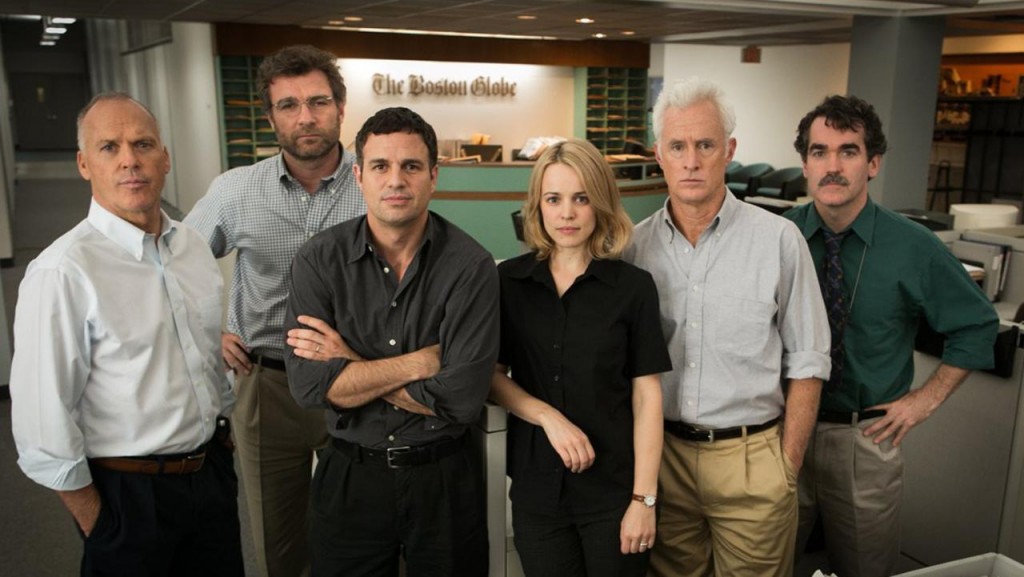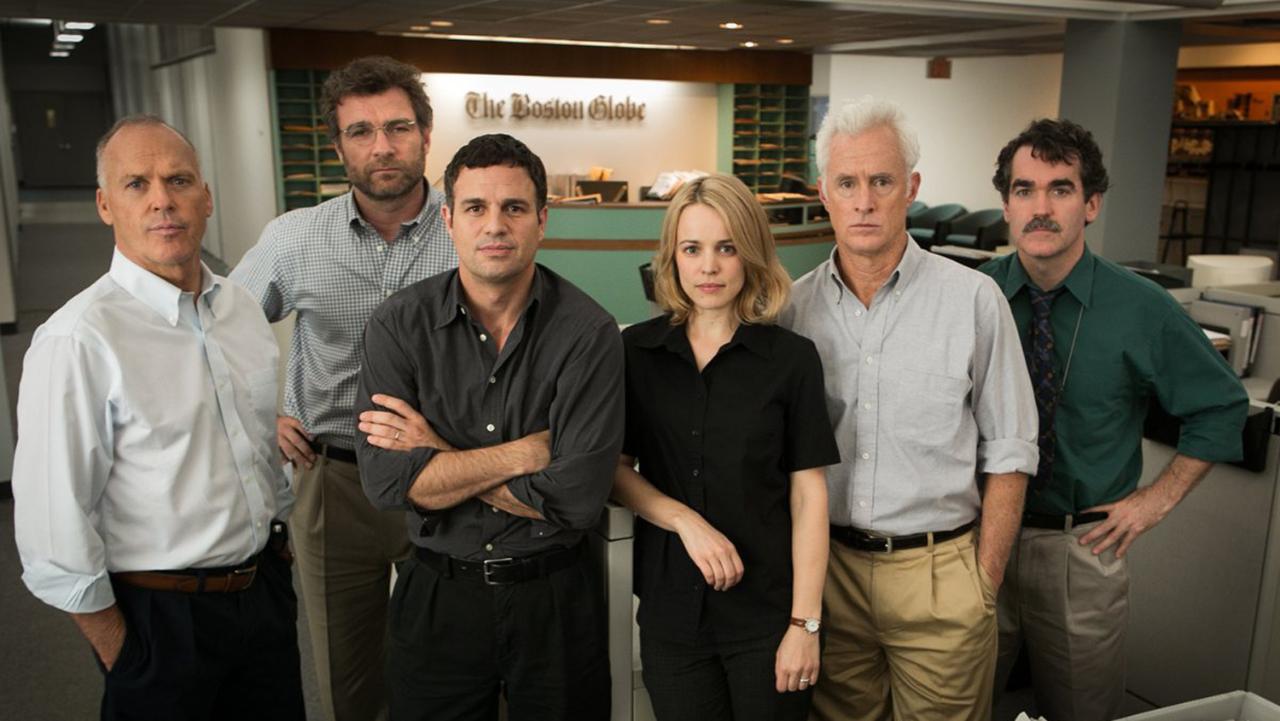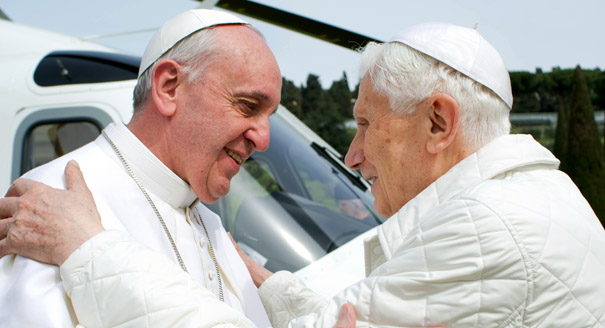 This post is part of the series Virtue Ethics at the Movies. You can read the first series post here, the post on Mad Max: Fury Road here, and the post on The Martian here.
This post is part of the series Virtue Ethics at the Movies. You can read the first series post here, the post on Mad Max: Fury Road here, and the post on The Martian here.
I sit, paralyzed, watching the credits roll. Suddenly hyper-aware that I am wearing my bright maroon Boston College hoodie I purchased the day of my dissertation defense, I anxiously stuff my arms into my jacket and wrap myself in the folds. For me, these gold letters are a source of pride and identification:
I am Catholic.
I am Jesuit educated.
I am a woman for others.
AMDG.
Ever to Excel.
For Boston.
But right now, these letters sear a hole through my chest, burning with humiliation that emerges at the very mention of the sex abuse crisis in the Catholic Church. I just watched a film that revealed how institutions to which I am loyal—ecclesial, educational, legal—failed to protect the most vulnerable members of society. I feel ill with shame and disgust.
Disgust and shame are narratively crucial to Spotlight’s intricately designed screenplay. As the whisper of abuse becomes a scream of scandal, a sickening sense of guilt and failure envelops each member of the Spotlight team. The film culminates not in a sense of journalistic triumph, but with a list of dioceses where abuse has been uncovered. No one wins; everyone has more work to do.
Our walk home from the theater is thick with emotion. I shout into the night with anger and lamentation. How could we let this happen? Why didn’t we defend our kids? Walking through the streets of Charlottesville, Virginia, we pass by a historical landmark of another institutional moral failure committed against children: a single sign on Preston Avenue recognizing the SCOTUS decision Buck v. Bell, a small reminder of the forced institutionalization and sterilization of thousands of poor children and teenagers at The Lynchburg Colony for the Epileptic and Feebleminded. It is easy to miss this small reminder of the enormous ineptitude of legal institutions responsible for pursuing justice, but on this night, it stands out to me against the emotional backdrop of the film. The institutional failure at Lynchburg rightfully instills shame and disgust for the sins of the eugenics movement in the United States. But the Lynchburg Colony and the Catholic Church are different: the latter claims to be the Body of Christ who calls the “little ones” and the “least of these” its own. The latter promises to protect the vulnerable and to be governed by the Gospel. The Church as Body of Christ is called to enact self-sacrifice, humbling itself for the sake of humankind. The Spotlight team’s story is remarkable because they traced the abuse beyond a couple of “bad apple” priests to the seemingly impenetrable institutional hierarchy. Indeed, the failure of the Church to be the Church in the face of injustice renders this abuse all the more shameful.
Disgust and shame have figured prominently in emotional responses to Spotlight. Some will argue that such emotions are at best unproductive and at worst destructive. How might Catholics and people of good will respond to these emotions in constructive ways that help us to (1) truly hear this story, especially as it emerges from victimized persons and (2) seek justice within ecclesial, legal, and educational institutions?
Martha Nussbaum defines emotions as cognitive appraisals of value. While she identifies emotions such as love and compassion as crucial for pursuing justice and equality, she cautions against the potential excesses of emotions such as disgust and shame, citing the risk of these emotions to forge chasms within society that prevent justice in a democratic context. Concerning disgust, she warns against the risk of this emotion eroding the common good (Political Emotions, 210). Further, she argues that shame can become a source of social stigma and must be managed in order to protect projects of justice and equality (360). Despite these concerns, Nussbaum’s theory leaves room for developing the positive potential of disgust and shame in larger justice projects. She stresses that these emotions are natural and commonplace and hints that they can be directed toward that which is unjust in ourselves and in society. It is natural to feel disgust for actions that are unjust. Likewise, shame is a natural and powerful emotion that can serve as one (among many) indications of unjust harm committed against others.
While Nussbaum writes about the nation rather than the Church, her theory provides a helpful framework for navigating emotional responses to institutional failure that results in deep personal and communal harms. Indeed, some responses to the film have been tinged with disgust and shame that reflects the divisive and stigmatizing aspects that Nussbaum identifies. Sometimes this disgust is directed toward the Church, questioning the legitimacy of an institution that failed to respond to widespread sexual abuse. In other cases, shame can lead to disgust directed at the film, seeking to defend the Church from accusations of evil or misrepresentations in the narrative. Building upon Nussbaum’s suggestion of the natural and potentially positive aspects of well-managed shame and disgust, could these emotions serve as a source for the pursuit of injustice? Can disgust and shame at their own failures prompt institutional leaders to confession, repentance, and reform? Can this shame lead people of good will to ask the tough questions of institutional leaders, inspiring truthful testimonies to power?
I hope so. Because, if we take our cue from the end of Spotlight, our work of confession, repentance, and reconciliation has only just begun.





Trackbacks/Pingbacks